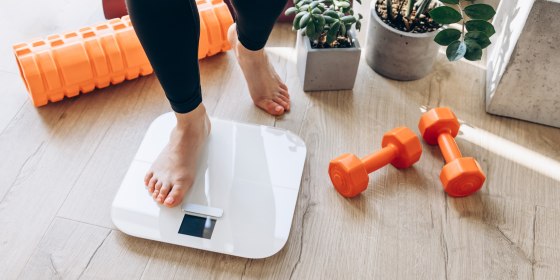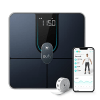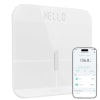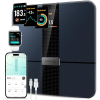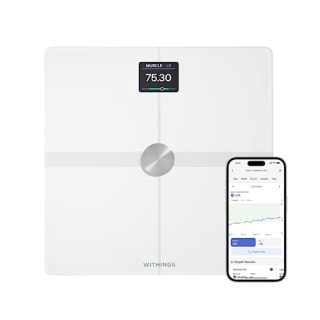Learning about your health can be a mixed bag. It can be fun — learning about my sleep habits and daily steps with the Oura Ring 4 was fascinating. But it can also be anxiety-inducing — longevity metrics on the Whoop stress me out.
I feel this tension especially around body weight scales. Body weight scales are simple: they measure your body weight. But that single number is complicated, and can mean different things to different people.
Smart scales offer an alternative: they typically measure over a dozen body metrics, not just your body weight. I spoke with health experts to better understand what they do, who should (and shouldn’t) use them, and whether or not they are even accurate.
A smart scale is a tool for weighing your body composition, with metrics that are more specific than just body weight. This includes body fat percentage, muscle mass, bone mass, water content and visceral fat. Smart scales can also measure other health metrics like heart rate and basal metabolic rate (BMR).
The smart scale is also able to save and chart these metrics over time, often sending them to a compatible smartphone app over Bluetooth or Wi-Fi.
Smart scales are not always accurate, and will not deliver perfect numbers for each metric, according to our experts. Smart scales typically use bioelectrical impedance analysis (BIA), which sends a low-level electric current through the body to estimate metrics like body fat percentage and muscle mass. But BIA is not the gold standard for measuring body composition — peer-reviewed studies have found many BIA smart scales tend to underestimate fat mass (among other things), says Austin Robinson, associate professor of kinesiology at Indiana University.
A DEXA (Dual-Energy X-ray Absorptiometry) scan is considered the gold standard for precise body composition measurements, according to all of our experts. But DEXA scans tend to be more expensive than smart scales, especially repeated scans, ruling them out as an option for many people.
While smart scales may not be perfectly accurate, they can be consistent enough to track changes and trends in your body over time, says Sarah Lynn Quick, a registered and certified dietician nutritionist and founder of Sarah Lynn Nutrition.
Either way, it’s important to remember that all body composition numbers are estimates, says Quick. “They can be affected by factors like having just eaten, exercised or [being] dehydrated.”
There are dozens of smart scales on the market, many from brands you may not have heard of. We narrowed down options and landed on our top picks by keeping the following in mind:
- Metrics: All of our top picks can read at least a dozen metrics, including weight, BMI, body fat percentage, visceral fat, muscle mass, bone mass, water percentage and basal metabolic rate (BMR). Some can track additional metrics like heart rate other things like your heart rate.
- Compatibility: We only selected models that are compatible with common health apps like Apple Health or Google Fit (in addition to the scale manufacturer’s app).
- Top rated: We selected models with at least a 4.0-star average rating from thousands of reviews on online storefronts like Amazon.
Want more from NBC Select? Sign up for our newsletter, The Selection, and shop smarter.
Our products come from electronics brands like Eufy, Wyze and Etekcity. We list key specifications like supported weight, apps and modes under the “What to know” dropdown. Our experts did not recommend specific smart scales for this guide.
Best overall
The Eufy Scale P2 Pro hits the right balance between features and price. It has a large, simple screen that shows you metrics in clear, white text. The app is where things get more colorful, with all your stats organized with icons, graphics, colors and more. It also supports an unlimited number of users, making it a good fit for large households.
Best budget
The Wyze Scale X costs a bit less than our top pick yet still manages to have all the features we consider essential. Like the Eufy scale, it has a simple screen that just shows one metric at a time in white text, though the scale itself is a bit larger. The app is similarly minimal and clean, with easy to read trend charts that don’t overwhelm you with information.
It has the best battery life of all our top picks — up to 22 months on four disposable AAA batteries. If you want more information on the scale itself, you could also consider the Wyze Scale Ultra, which has a larger, more colorful screen, but is pricier and has less battery life.
Best upgrade
If you’re willing to spend a little more, this smart scale from Etekcity has two big advantages over our lower-priced picks. The scale’s screen is large and colorful, and can display informative graphs for nine different metrics. The scale can also sync with most apps, including Samsung Health, Google Fit, Apple Health and MyFitnessPal (our other picks are mostly limited to Apple and Google apps).
You may want to avoid this model if you don’t like recharging your devices — it is our only pick that’s USB-C rechargeable, which you may love or hate.
Best splurge
This smart scale from Withings has the most advanced features and app of any on our list. It has extra modes that separate it from competitors, especially Eyes-Closed Mode and Athlete Mode.
In Eyes-Closed Mode, the scale logs your metrics and adds them to the app, but does not show any numbers or graphs on the scale itself, instead displaying cheerful emojis, animations and a weather report. Athlete Mode manually adjusts the app’s algorithm so that fat mass values will be lower and muscle mass measurement will be higher — Withings suggests considering this mode if you work out more than eight hours a week and have a resting heart rate below 60 beats per minute.
The app is also more robust than our other picks — Withings also makes smartwatches, so it makes sense its app would be a little more in-depth. The app lets you look over your metrics, read more information about each metric, gives tips on using the scale and more. It also has a few social components like friends lists and challenges to complete.
Smart scales are best for specific use cases, according to our experts. They can be useful for athletes or people strength training who want a more specific breakdown of their body composition than just body weight. They can also be useful in remote patient monitoring programs (think weight management or heart conditions). The Medicare Diabetes Prevention Program, for example, requires body weight measurements for billing purposes — those can be sent remotely with a smart scale, says Sarah Hales, a licensed social worker and associate professor at the Medical University of South Carolina (MUSC) Weight Management Center.
Anyone with a pacemaker or similar implanted device should avoid using smart scales. Smart scales use BMI, which uses a low-level electrical current to estimate body composition — this can interfere with these kinds of implanted devices, says Quick. Smart scales can also be inaccurate for people who are pregnant, as pregnancy can cause fluid shifts, says Quick.
Anyone with an eating disorder or obsessive tracking behaviors should definitely not use a smart scale, according to our experts. If weighing yourself regularly causes anxiety or disordered eating patterns, if a lot of data is overwhelming or discouraging, smart scales may not be a good fit for you.
All of our experts explained that, regardless of smart scale accuracy, the actual metrics being displayed can be confusing to people who don’t understand them.
BMI, for example, does not distinguish between fat and muscle mass, so it can be misleading for athletes, people with high muscle mass and certain body types, says Quick. Body water percentage can help you monitor hydration, but it fluctuates significantly from day to day.
Before you jump to conclusions, it’s best to understand what each metric means, or better yet, go over them with a professional.
“I also generally encourage people not to step on the scale every single day, especially if it tends to create anxiety,” says Quick. “You can still get great trends by weighing one to two times per week.”
At NBC Select, we work with experts who have specialized knowledge and authority based on relevant training and/or experience. We also take steps to ensure all expert advice and recommendations are made independently and without undisclosed financial conflicts of interest.
- Sarah Lynn Quick is a registered and certified dietician nutritionist and the founder and CEO of Sarah Lynn Nutrition.
- Austin Robinson, PhD, is an associate professor of kinesiology at Indiana University.
- Sarah Hales, PhD, is a licensed social worker and an associate professor at the Medical University of South Carolina (MUSC) Weight Management Center.
I’m a reporter at NBC Select who covers technology and fitness including recent stories on air purifiers, wireless earbuds, and walking shoes. For this piece, I spoke with professors of health and registered dietitians to better understand what smart scales do and how best to use them.
Catch up on NBC Select’s in-depth coverage of tech and tools, wellness and more, and follow us on Facebook, Instagram, Twitter and TikTok to stay up to date.
